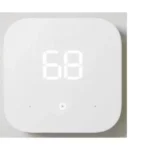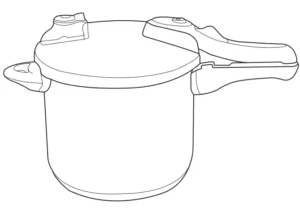
 Pressure Cooker
Pressure Cooker
Welcome Guide
Contents:
Before getting started, ensure the package contains the following components:
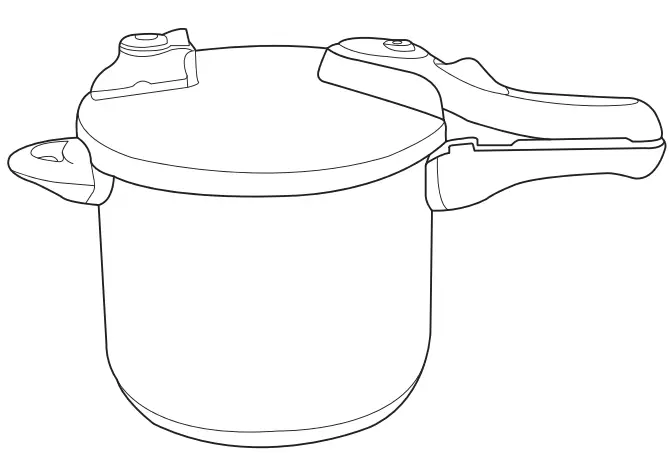
- Pressure regulator valve
- Safety valve/Pressure indicator
- Push Button
- Safety window
- Locking marks
- Lid Safety Window
- Handle with flame protection
- Body of the pot
- Triple Bottom
- Rubber Gasket
Safety and Compliance
PLEASE READ ALL INSTRUCTIONS BEFORE FIRST USE. KEEP THESE INSTRUCTIONS FOR FUTURE REFERENCE. IMPORTANT!
If repairs are necessary, please contact our Customer service department. Repairs may only be undertaken by authorized repairers.
- When using pressure cookers, basic safety precautions should always be followed:
- Read all instructions thoroughly.
- Do not touch hot surfaces; use handles or knobs.
- Close supervision is necessary when the pressure cooker is used near children.
- Do not place the pressure cooker in a heated oven.
- Extreme caution must be used when moving a pressure cooker containing hot liquids.
- Do not use the pressure cooker other than for its intended
- This appliance cooks under pressure – improper use may result in a scalding injury. Ensure the unit is properly closed before operating. See pages 9 and 10.
- Do not fill the unit over 2/3 (two-thirds) full. When cooking foods that expand during cooking, such as rice or dried vegetables, do not fill the unit over 1/2 (half) full. Overfilling may cause the vent pipe to clog, causing the unit to develop excess pressure. See page 9.
- Be aware that certain foods, such as apple sauce, cranberries, pearl barley, oatmeal or other cereals, split peas, noodles, macaroni, rhubarb, or spaghetti can foam and froth and clog the pressure release device (steam vent). These foods should not be cooked in a pressure cooker.
- Always check the pressure release devices for clogging before
- Do not open the pressure cooker until the unit has cooled and all internal pressure has been released. If the handles are difficult to push apart, this indicates that the cooker is still pressurized – do not force it open. Any pressure in the cooker can be hazardous. See page 10.
- Do not use this pressure cooker for pressure frying with oil.
- When the normal operating pressure is reached, turn the heat down so all the liquid, which creates the steam, does not evaporate.
- Never use your pressure cooker without adding water, this would seriously damage it.
- Use the appropriate heat source(s) according to the instructions for use.
- After cooking meat with skin (e.g. ox tongue) that may swell under the effect of pressure, do not prick the meat while the skin is swollen; you might be scalded.
- When cooking doughy food, gently shake the cooker before opening the lid to avoid food ejection.
- Do not tamper with any of the safety systems beyond the maintenance instructions specified in the instructions for use.
- Only use manufacturer’s spare parts in accordance with the relevant model. In particular, use a body and a lid from the same manufacturer indicated as being compatible.
BEFORE FIRST USING THE PRESSURE COOKER, PLEASE READ ALL INSTRUCTIONS THOROUGHLY.
- During the cooking process, the safety devices must not be interfered with.
- When the pressure cooker is under pressure, force must never be used to open it; the pressure cooker must be allowed to cool down before it is opened. Steam pressure must be completely released otherwise it will not be possible to open the cooker. Please observe the opening instructions (page 10).
- Do not undertake any modifications to the safety devices, otherwise, there is a risk of scalding. When releasing the steam, keep your hands, head, and body clear of the steam.
- Only original accessories and spare parts or lids and pans, specifically designed for these pressure cookers should be
- Pressure cookers or accessories which are deformed or damaged in any way should not be used under any
- If repairs are necessary at any time, please contact our Customer Service department
Before Cooking
- Each time before using the pressure cooker, check that the safety valve, pressure regulator valve, and sealing ring are clean and in proper working order.
- Pay special attention to the fact that the safety valve on the underside of the lid should be free to move (“wiggles”) and cannot be pushed so far into the recess of the lid that the red pin can be seen on top of the lid – this should only happen when the lid is locked and pressure has built up inside the cooker.
KEEP THESE INSTRUCTIONS.
Superiority
- Comparatively shorter cooker time than used for normal cookers
It cost 10 percent of cooking time as normally for cooking beef, 50 percent for red beans. Cooking time varies for different foods. - Maximum fuel economy
It cost 1/15 heating energy as normally for cooking beef, 1/3 for red beans. As higher cooking temperatures the cooking time required is greatly reduced so saving time and energy. - Better performance in nutrition saving
Smaller amounts of cooking liquid are required due to the pressurized cooking way, and little liquids are lost during cooking so the maximum nutritional value of food is maintained. - Easy to tenderize food
The higher pressure forces heat through the food and increase the tenderizing effects of cooking beef, shanks brisket, and other tough foods.
Regulator: There are four levels, two working pressure levels 50Kpa and 90Kpa, one emit pressure level and one removing mode for cleaning. Different food chooses different working pressure levels
The control module of the Pressure control valve:
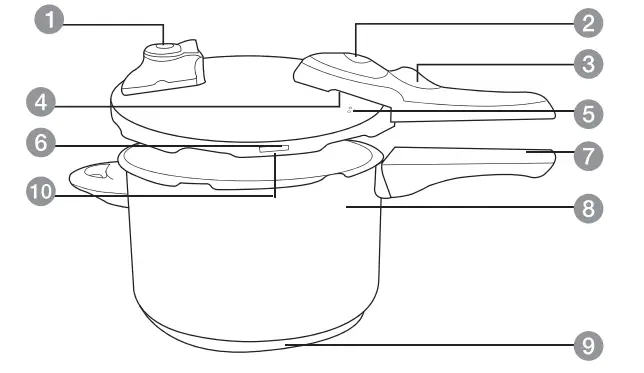
2- 90 Kpa
1- 50 Kpa
![]() Steam release position
Steam release position
![]() Removing the module
Removing the module
Safety valve / Pressure indicator: Safety valve will automatically check inside pressure, when the inside pressure is lower than the safety opening pressure, the valve will drop down then it is safe to open the lid.
If the cooker has pressure inside, the valve post will rise up, the red cap will appear from the hole in the handle. The safety valve will automatically emit overpressure to make it safe. If the lid does not lock properly, the inside pressure does not go up, the safety valve only emits steam pressure, in this case, you should stop heating and lock the lid properly.
Safety window: There is a safety window on the side of the lid. It will release steam when the regulator and safety valve can’t work properly or too much steam inside. Make sure the cooker is safe.
Operating Instructions
FILL THE PAN WITH SUFFICIENT LIQUID TO GENERATE THE NECESSARY STEAM (WATER, SAUCE, OR STOCK).
![]() Always add adequate liquid. Never let the pressure cooker “cook dry”.
Always add adequate liquid. Never let the pressure cooker “cook dry”.
MINIMUM & MAXIMUM AMOUNT OF FOOD
Minimum 1/3 (one-third) of a liter of liquid (330m1).
Maximum 1/2 (half) full for foods that swell or tend to foam up.
Maximum 2/3 (two-thirds) full for all other cooking.

CLOSING THE PRESSURE COOKER

Before placing the lid on the pressure cooker, ensure the silicone ring/gasket is placed correctly. Then, place the lid so that the markings on the lid and handle are adjacent, and slide handles so they end up one over the other. Pull the Red Push Button towards you (longer handle)it is locked
Select the desired cooking level with the help of the pressure regulator valve:
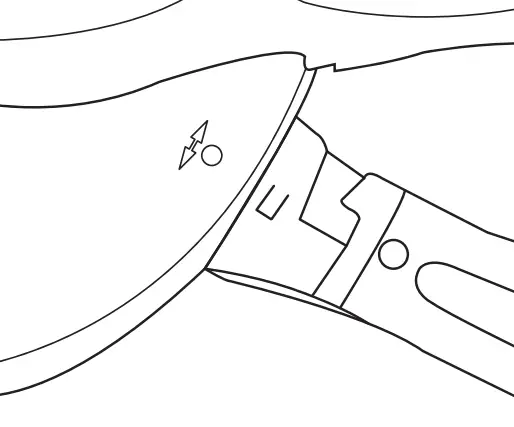 |
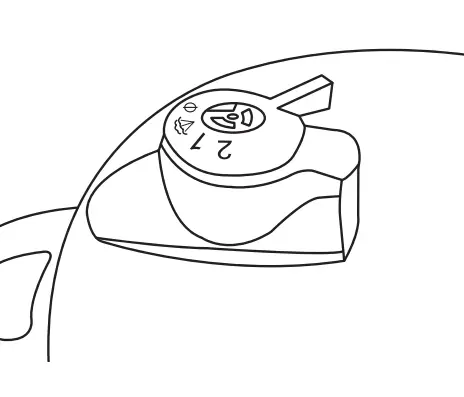 |
POSITION 1:
Gentle cooking at about 50kPa -111.35°C For steaming and stewing more delicate foods such as vegetables, fish, fruit, etc.
POSITION 2:
Fast cooking at about 90kPa – 118.6°C.
For cooking and braising, e.g. meat, soups, stews, etc.
PLACE THE PRESSURE COOKER WITH A PRESET COOKING SETTING ON THE CORRECT SOURCE OF HEAT, AND TURN THIS UP TO FULL POWER.
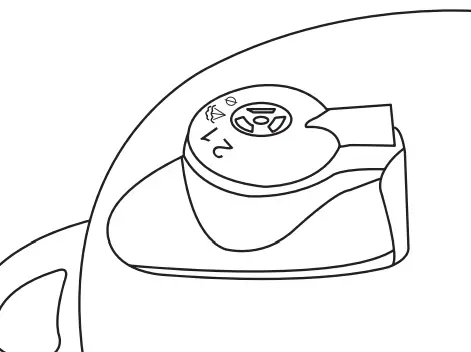
When the working pressure is reached, the regulator valve releases steam continuously so that no excess pressure can build up. Only at this point should the source of heat be turned down.
Releasing The Pressure
Turn off the heat source when cooking time is completed. Take the cooker away from the hob and place it on a suitable surface.
The pressure, you have the following options:
LET IT COOL DOWN:

Wait until the safety valve has completely disappeared. This is the recommended method for foods that are mushy or tend to foam.
GRADUAL RELEASE OF PRESSURE:
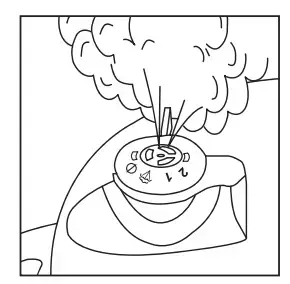 Turn the pressure regulator valve slowly to this position:
Turn the pressure regulator valve slowly to this position:![]()
![]() The escaping steam is extremely hot. The steam escapes vertically, so please do not hold your hands above the valve. Wait until all the steam has escaped and the pressure indicator is no longer visible. This method is not suitable for foods that are mushy or tend to foam.
The escaping steam is extremely hot. The steam escapes vertically, so please do not hold your hands above the valve. Wait until all the steam has escaped and the pressure indicator is no longer visible. This method is not suitable for foods that are mushy or tend to foam.
QUICK-RELEASE OF PRESSURE:
This model does not support the quick release method.
Do not release pressure by running tap water on top of the lid.
![]() Never use force to open the lid, and never interfere with the safety systems. The cooker can only be opened when it is no longer under pressure.
Never use force to open the lid, and never interfere with the safety systems. The cooker can only be opened when it is no longer under pressure.
![]() Never submerge the cooker in water.
Never submerge the cooker in water.
Cleaning and Maintenance
Clean your pressure cooker after every use with hot water and washing-up liquid. Please do not use any abrasive or caustic cleaners, or cleaners containing chlorine.
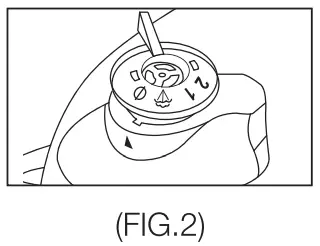
The cooker – without its lid – can also be cleaned in the dishwasher. The lid should always be cleaned by hand.
CLEANING & REPLACING THE SEALING RING (GASKET)
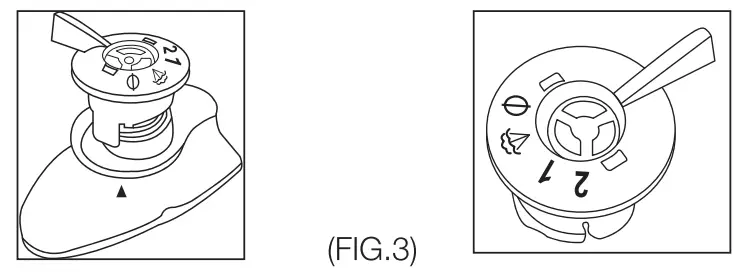
To clean the sealing ring, rinse it under hot running water and dry it. As soon as the sealing ring becomes hard and turns a brownish color it should be replaced.
CLEANING THE SAFETY VALVE Clean the base of the valve on the inside of the cooker.

Check that it is functioning properly with light pressure on the pin.
CLEANING THE PRESSURE REGULATOR VALVE:
Use a bright light to check that the valve passages under the regulator valve are not blocked.
Clean these with a needle or a pin. (FIG.1)
Turn the plastic top into positionØ. (FIG.2)
Press the pressure regulator valve against the lid, and pull the pressure regulator until it comes off (FIG.3).
Clean with water and mild soap. After cleaning the pressure valve, assemble using the reverse method.

Storage
- Store in a cool and dry place out of reach of children.
- After long disuse, the rubber gasket may harden and cease to perform its function. Always check before using the product again and if necessary replace it.
Trouble-Shooting
| Problem | Solution |
| The pressure cooker takes a long time to come to the boil: |
|
| The pressure indicator does not rise, and during cooking, no steam escapes from the valve: | This is perfectly normal in the first few minutes If this persists, check whether:
|
| The safety valve has risen, and during cooking, no steam escapes from the pressure regulator valve: |
|
| Steam escapes from all around the lid: |
|
| The lid cannot be opened: |
|
| The food being cooked is either not fully cooked or overcooked: |
|
| The food being cooked has burnt onto the cooker: |
|
| One of the safety devices is triggered: |
|
Specifications
| Item number | B071G5KNXK | B071WPLND2 |
| Body diameter | 8.66 in (22 cm) | 8.66 in (22 cm) |
| Nominal capacity | 4.0 L | 6.0 L |
| Working pressure | 50 (kPa) or 7.25 psi – Max. 111.35°C | 90 (kPa) or 13.05 psi – Max. 118.6°C |
Warranty Information
To obtain a copy of the warranty for this product:
![]() US: Visit amazon.com/AmazonBasics/Warranty
US: Visit amazon.com/AmazonBasics/Warranty
![]() UK: Visit amazon.co.uk/basics-warranty
UK: Visit amazon.co.uk/basics-warranty
![]() US: +1-866-216-1072
US: +1-866-216-1072
![]() UK: +44 (0) 800-279-7234
UK: +44 (0) 800-279-7234
Feedback and Help
Love it? Hate it? Let us know with a customer review. AmazonBasics is committed to delivering customer-driven products that live up to your high standards. We encourage you to write a review sharing your experiences with the product.
![]() US: amazon.com/review/review-your-purchases#
US: amazon.com/review/review-your-purchases#
![]() UK: amazon.co.uk/review/review-your-purchases#
UK: amazon.co.uk/review/review-your-purchases#
![]() US: amazon.com/gp/help/customer/contact-us
US: amazon.com/gp/help/customer/contact-us
![]() UK: amazon.co.uk/gp/help/customer/contact-us
UK: amazon.co.uk/gp/help/customer/contact-us
 amazon.com/AmazonBasics
amazon.com/AmazonBasics
MADE IN CHINA
V1-06/19

